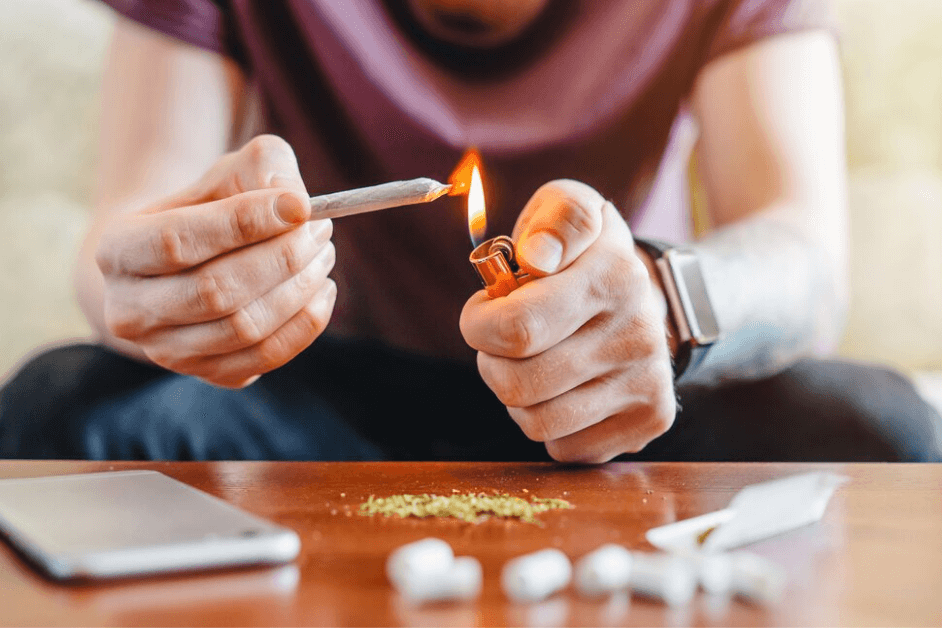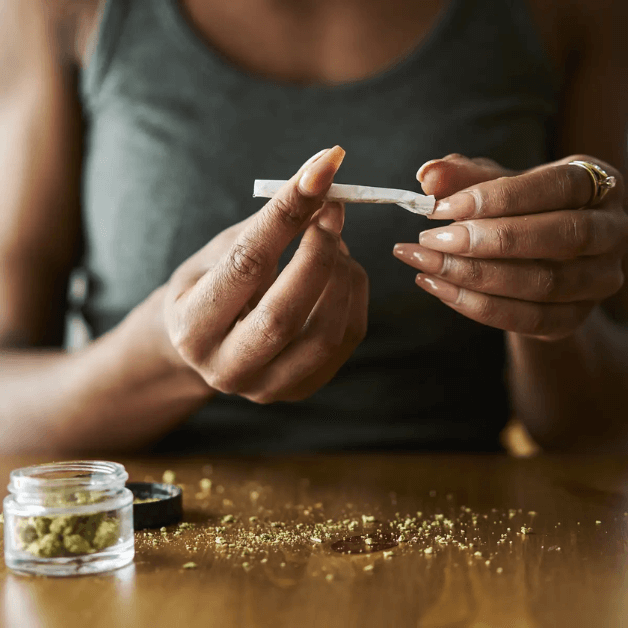Cannabis
Is Weed Addictive?
Most people want to believe that people can not get marijuana addiction. However, concrete evidence suggests that heavy cannabis use for extended periods can create physical dependence and addiction. Other people develop marijuana tolerance, so they need more marijuana flowers to have the same effects.
Young adults are the most vulnerable group due to pervasive cannabis use. Additionally, the brains of young people are still developing.
The National Institute on Drug Abuse estimates that 9% of marijuana users will develop a dependency on the drug. The risk is 17% for users who start smoking marijuana early, which is higher.
The number of people who get into treatment programs due to marijuana use is relatively small. Many do not acknowledge cannabis dependence and are unlikely to go to a treatment center to find help.
What Is Weed?
Weed, also called marijuana, pot, ganja, and various other names, is a psychoactive drug derived from the Cannabis sativa plant. THC is the primary psychoactive component of weed. THC affects the reward system in the brain, affecting how the brain processes weed, leading to tolerance.
Smoked marijuana is retained in the lungs for a long time. You will have about four times more tar in your lungs when you smoke a joint of marijuana than when you smoke tobacco.
Short-term side effects of using marijuana include:
- Short-term memory loss
- Impaired physical coordination
- Engaging in high-risk sexual activities
- Poor decision-making due to impaired judgment
- Mood changes
- Delusions
- Increased blood pressure
Long-term effects of marijuana use include impaired brain function and marijuana use disorder. Developing cannabis use disorder is a critical issue in long-term marijuana use. It prevents an individual from meeting their obligations in school and work.
How Does Cannabis Work?
THC in marijuana activates cannabinoid receptors, which are found in the parts of the brain concerned with learning, memory, and the reward system. It triggers the release of dopamine, which is a feel-good hormone.
You can tell someone is addicted to marijuana when they cannot stop, even if they want to. People who use marijuana to find relaxation are likely dependent on the drug.
Medical marijuana is used to manage chronic pain and manage symptoms of chronic illnesses. It helps manage symptoms of multiple sclerosis and reverses decreased appetite in patients.
Medical cannabis is also used to help patients with trouble sleeping, such as those with fibromyalgia and sleep apnea. It can also be helpful for patients with anxiety and sleep difficulties.
Chronic marijuana use could result in reduced quality of life. The users are generally less satisfied with life and their achievements.
Other effects of chronic cannabis use include:
- Impaired physical or psychological well-being
- Lower IQ
- Poor education outcomes
- Impaired fertility
- Unmasking of underlying psychotic disorders
- Respiratory disorders due to chronic smoking
Can You Get Addicted to Weed?
Most people ask, is marijuana addictive? Yes, marijuana is the third most addictive substance after tobacco and alcohol. However, cannabis addiction is nowhere near as addictive as nicotine products, as you would find on websites like SmokesCanada. When marijuana use occurs over a long time, it could result in mental health issues. Users could experience temporary hallucinations and paranoia.
Cannabis use is also associated with depression, anxiety, and suicidal thoughts. Other effects of cannabis addiction include developing cannabis use disorder and hindering people from meeting their obligations in school or work.
Evidence suggests that marijuana could be a gateway drug, making users susceptible to using other drugs. Cannabis use alters the brain’s reward system, changing how it responds to other drugs. Other factors, such as an individual’s social environment, could worsen the risk of drug use.
Cannabis use disorder is a range of patterns associated with cannabis use where the user s in distress and experiences impairment so that meeting school or work obligations become a problem.
Marijuana use disorder could result after chronic marijuana use. The Diagnostic and Statistical Manual of mental disorders (DSM-5), designed by the American Psychiatric Association, identifies criteria to establish marijuana abuse and dependence.
Cannabis use disorder is defined as one resulting in impairments of clinical significance as demonstrated by any two of these:
- They are frequent users of cannabis
- Unsuccessful efforts to stop using
- Significant time spent seeking, using, or trying to stop using cannabis
- A strong urge to smoke marijuana
- Recurrent use that interferes with school or work
- Choosing cannabis use instead of attending significant social or recreational activities
- Cannabis use even when it is risky to consume it
- Marijuana tolerance – necessitates higher doses to get the desired effect
- Withdrawal syndrome – leads to marijuana abuse to avoid the symptoms
Ways to Control Your Marijuana Usage
Marijuana use is manageable. If there is no dependence, you can stop on your own. However, marijuana dependence could require the help of health professionals and family.
If not addressed, frequent marijuana use could increase health risks for teenagers and young adults.
Managing Marijuana Use
Marijuana use and dependence could come with various physical or psychological problems. Managing marijuana use should focus on addressing physical and psychological issues.
Detoxification helps address physical dependence, while psychiatric services address psychological reliance.
Team effort is needed to help individuals overcome marijuana dependence. Cognitive behavioural therapy is recommended, with a focus on underlying psychological issues.
Withdrawal Symptoms
Withdrawal symptoms could occur, although they are less severe when cessation occurs gradually.
Cannabis withdrawal symptoms are exhibited as physical and psychological symptoms.
The physical symptoms may include:
- Tremors and shakes
- Sweating
- Headache
- Pain in the abdomen
The mental symptoms could include:
- Being irritable
- Anxiety
- Sleep difficulty
- Depressive symptoms
- Restlessness
Withdrawal is said to occur if two mental and one physical symptom are present. People who avoid withdrawal symptoms often have a poor prognosis because they buy marijuana to prevent withdrawal symptoms. They have an increased risk of relapsing.
Conclusion
Weed addiction could occur with frequent marijuana use for extended periods. Users who have developed dependency could experience withdrawal symptoms when they try to stop. Gradually stopping marijuana use could ease withdrawal symptoms.
Marijuana use disorder prevents users from being productive. They might have poor outcomes at school or work. Seeking professional help can reverse the effects of marijuana addiction.
References
- Government of Canada. (2018, October 17). Is cannabis addictive? https://www.canada.ca/en/health-canada/services/publications/drugs-health-products/cannabis-addictive.html
- Government of Canada. (2022, January 18). Addiction to cannabis. canada.ca. https://www.canada.ca/en/health-canada/services/drugs-medication/cannabis/health-effects/addiction.html
- WeedSmart. (2023, February 1). Canada’s Best Marijuana Dispensary | Online Dispensary Canada. Available at: https://weedsmart.cc/
- National Institute on Drug Abuse. (2020, July). Is marijuana addictive? National Institute on Drug Abuse. https://nida.nih.gov/publications/research-reports/marijuana/marijuana-addictive
- Body Builder Gyms (2023, February 1). Find the Best Gyms in Canada. Available at: https://bodybuildergym.net/
- National Institute on Drug Abuse. (2020, June). What is marijuana? https://nida.nih.gov/publications/research-reports/marijuana/what-marijuana
- Patel, J., & Marwaha, R. (2022, July 11). Cannabis use disorder – StatPearls – NCBI bookshelf. National Center for Biotechnology Information. https://www.ncbi.nlm.nih.gov/books/NBK538131
- Smokes Canada. (2023, June 25). Buy Cheap Cigarettes Online in Canada. Available at: https://smokescanada.com/






